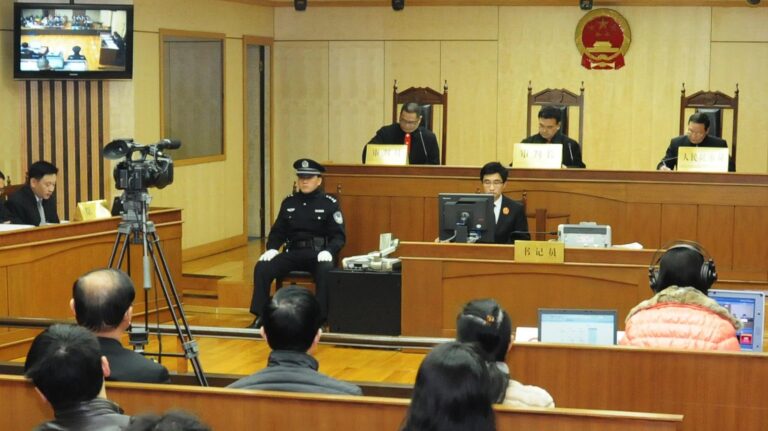Chinese courts have expanded their authority to restrict the international travel of individuals, including those not formally accused of any wrongdoing, according to recent reports. This move, highlighting the judiciary’s broadening reach, allows courts to bar individuals from leaving the country as part of civil and administrative cases. The development raises concerns about due process and personal freedoms, as well as the implications for both domestic and international perceptions of China’s legal system.
Chinese Courts Expand Exit Bans Beyond Criminal Accusations Impacting International Travel
In a significant shift, Chinese courts have broadened their scope of exit bans, now affecting individuals who are not necessarily linked to any criminal investigations. This expansion includes civil disputes and financial disagreements, thereby complicating international travel plans for many citizens and foreign nationals alike. Those caught in the crossfire find themselves unable to leave the country, frequently without prior warning or clear reasoning, raising concerns about transparency and due process.
The types of cases triggering these restrictions have diversified. The measures aim to enforce court orders, particularly regarding unpaid debts or unresolved legal obligations, reflecting China’s push to tighten control over civil compliance. Key aspects include:
- Debt-related disputes: Consumers and business owners with unresolved financial claims.
- Civil litigation: Participants involved in ongoing lawsuits can be subject to exit bans.
- Enforcement of judgments: Ensuring compliance with court rulings beyond criminal matters.
| Category | Typical Trigger | Impact on Travel |
|---|---|---|
| Criminal Cases | Pending charges or investigations | Complete travel ban |
| Civil Disputes | Unpaid debts, lawsuit proceedings | Restricted or delayed exit |
| Financial Enforcement | Failure to comply with rulings | Temporary ban until resolution |
Legal and Human Rights Implications of Exit Restrictions Without Formal Charges
Restricting individuals from leaving a country without formally accusing them of a crime raises profound legal challenges, undermining the foundational principles of due process and the presumption of innocence. Such exit bans essentially function as punitive measures imposed without judicial oversight, denying individuals the right to travel freely-an internationally recognized human right under Article 13 of the Universal Declaration of Human Rights. The absence of clear legal rationale or transparent procedures not only leaves those affected in legal limbo but also erodes public trust in the judicial system’s fairness and impartiality.
Human rights organizations highlight several critical concerns linked to these restrictions:
- Violation of Freedom of Movement: Individuals are barred from crossing borders without any formal basis, often indefinitely.
- Lack of Legal Recourse: Few meaningful channels exist to challenge or appeal exit bans effectively.
- Potential for Arbitrary Use: The mechanism can be employed selectively, targeting dissidents, activists, or individuals linked to sensitive political issues.
| Aspect | Implication |
|---|---|
| Due Process | Undermined by lack of formal charges and transparent hearings. |
| Freedom of Movement | Restricted without evidence or court orders. |
| Accountability | Diminished because of opaque legal standards. |
Recommendations for Foreign Governments and Travelers Navigating Chinese Judicial Controls
Foreign governments should enhance diplomatic engagement to address the growing complexity of Chinese judicial restrictions. Proactive communication channels with Chinese authorities can help clarify the criteria and processes behind exit bans, enabling diplomats to assist their nationals more effectively. It is also crucial for governments to maintain up-to-date advisories that inform travelers of potential risks associated with business, family, or legal disputes that may trigger travel restrictions. Establishing rapid response teams that specialize in navigating these judicial controls can provide timely support, reducing the chances of prolonged detentions or travel disruptions.
Travelers themselves must exercise heightened vigilance by conducting thorough background checks on personal and professional engagements linked to China, especially in sectors prone to legal entanglements. It is advisable to:
- Register with their embassy or consulate upon arrival for immediate assistance.
- Avoid entanglement in contentious civil disputes that may escalate beyond their control.
- Maintain comprehensive documentation of all interactions with Chinese officials or entities.
- Seek legal counsel knowledgeable in Chinese law prior to travel if concerns arise.
| Recommended Action | Benefit |
|---|---|
| Embassy Registration | Facilitates immediate consular intervention |
| Legal Preparedness | Minimizes risk of unanticipated legal restrictions |
| Document Preservation | Supports defense against unjust restrictions |
| Diplomatic Engagement | Promotes transparent dispute resolution |
To Wrap It Up
As China expands the scope of its exit bans beyond individuals formally accused of wrongdoing, the move raises new questions about due process and personal freedoms. While authorities assert these measures are necessary for legal enforcement and social order, critics warn they risk undermining international confidence and could entangle innocent individuals in opaque judicial controls. As the world watches closely, the evolving use of travel restrictions in China will remain a critical issue at the intersection of law, human rights, and geopolitics.




